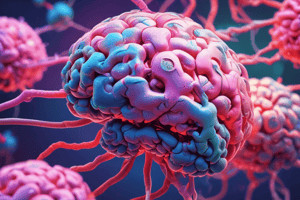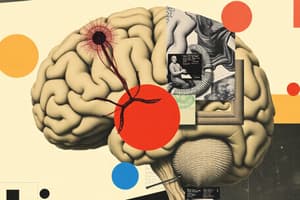Podcast
Questions and Answers
What is acetylcholine?
What is acetylcholine?
- A neurotransmitter (correct)
- A hormone
- A blood vessel
- A type of muscle cell
What does akinetic pertain to?
What does akinetic pertain to?
A lack of movement
What is analgesia?
What is analgesia?
Without excessive sensitivity to pain
Define anencephaly.
Define anencephaly.
What is the meaning of anesthesia?
What is the meaning of anesthesia?
Describe aphasia.
Describe aphasia.
What does apraxia refer to?
What does apraxia refer to?
What is the arachnoid membrane?
What is the arachnoid membrane?
What does an astrocyte do?
What does an astrocyte do?
What is ataxia?
What is ataxia?
Define autonomic nervous membrane.
Define autonomic nervous membrane.
What is the axon?
What is the axon?
What does the blood-brain barrier do?
What does the blood-brain barrier do?
What is bradykinesia?
What is bradykinesia?
What is the brainstem?
What is the brainstem?
What does cauda equina refer to?
What does cauda equina refer to?
What is causalgia?
What is causalgia?
What does cephalgia mean?
What does cephalgia mean?
What does cerebellar refer to?
What does cerebellar refer to?
What does cerebellopontine refer to?
What does cerebellopontine refer to?
What is the cerebellum responsible for?
What is the cerebellum responsible for?
What is the cerebral cortex?
What is the cerebral cortex?
What is cerebrospinal fluid?
What is cerebrospinal fluid?
What part of the brain is the cerebrum?
What part of the brain is the cerebrum?
Define coma.
Define coma.
What does comatose pertain to?
What does comatose pertain to?
What is a dendrite?
What is a dendrite?
What is dura mater?
What is dura mater?
What is dyslexia?
What is dyslexia?
What is encephalitis?
What is encephalitis?
What is encephalopathy?
What is encephalopathy?
What is an ependymal cell?
What is an ependymal cell?
What is epidural hematoma?
What is epidural hematoma?
What does epilepsy refer to?
What does epilepsy refer to?
What is a ganglion?
What is a ganglion?
What is a glial cell?
What is a glial cell?
What is glioblastoma?
What is glioblastoma?
What are gyri?
What are gyri?
What is hemiparesis?
What is hemiparesis?
What is hemiplegia?
What is hemiplegia?
What is hypalgesia?
What is hypalgesia?
What is hyperesthesia?
What is hyperesthesia?
What does hyperkinesis refer to?
What does hyperkinesis refer to?
Where is the hypothalamus located?
Where is the hypothalamus located?
What does intrathecal mean?
What does intrathecal mean?
What is leptomeningitis?
What is leptomeningitis?
What does medulla oblongata control?
What does medulla oblongata control?
What does meningeal pertain to?
What does meningeal pertain to?
What are meninges?
What are meninges?
What is a meningioma?
What is a meningioma?
What does meningomyelocele refer to?
What does meningomyelocele refer to?
What is a microglial cell?
What is a microglial cell?
What do motor nerves do?
What do motor nerves do?
What is a myelin sheath?
What is a myelin sheath?
What does myelogram refer to?
What does myelogram refer to?
What does myoneural mean?
What does myoneural mean?
What is narcolepsy?
What is narcolepsy?
What is neuralgia?
What is neuralgia?
What does neurasthenia refer to?
What does neurasthenia refer to?
What is neuroglia?
What is neuroglia?
What is a neuron?
What is a neuron?
What does neuropathy refer to?
What does neuropathy refer to?
What is a neurotransmitter?
What is a neurotransmitter?
What is an oligodendroglial cell?
What is an oligodendroglial cell?
What is paraplegia?
What is paraplegia?
What do parasympathetic nerves do?
What do parasympathetic nerves do?
What is parenchyma?
What is parenchyma?
What is paresis?
What is paresis?
What is paresthesia?
What is paresthesia?
What is the peripheral nervous system?
What is the peripheral nervous system?
What is pia mater?
What is pia mater?
What is a plexus?
What is a plexus?
What is poliomyelitis?
What is poliomyelitis?
What is polyneuritis?
What is polyneuritis?
What does pons refer to?
What does pons refer to?
What is quadriplegia?
What is quadriplegia?
What is radiculopathy?
What is radiculopathy?
What is radiculitis?
What is radiculitis?
What do sensory nerves do?
What do sensory nerves do?
What is a stimulus?
What is a stimulus?
What is a stroma?
What is a stroma?
What is a subdural hematoma?
What is a subdural hematoma?
What are sulci?
What are sulci?
What do sympathetic nerves influence?
What do sympathetic nerves influence?
What is a synapse?
What is a synapse?
What does syncopal mean?
What does syncopal mean?
What is syncope?
What is syncope?
What does thalamic refer to?
What does thalamic refer to?
What is thalamus responsible for?
What is thalamus responsible for?
What does vagal refer to?
What does vagal refer to?
What are the ventricles of the brain?
What are the ventricles of the brain?
What are absence seizures?
What are absence seizures?
What is Alzheimer disease?
What is Alzheimer disease?
What is amyotrophic lateral sclerosis (ALS)?
What is amyotrophic lateral sclerosis (ALS)?
What is an aneurysm?
What is an aneurysm?
What is astrocytoma?
What is astrocytoma?
What is an aura?
What is an aura?
What is Bell's palsy?
What is Bell's palsy?
What is cerebral angiography?
What is cerebral angiography?
What is cerebral concussion?
What is cerebral concussion?
Flashcards are hidden until you start studying
Study Notes
Neurotransmitters and Nerve Functions
- Acetylcholine is a key neurotransmitter released at the ends of some nerve cells, crucial for transmitting signals.
- Analgesia refers to the absence of excessive sensitivity to pain, highlighting the body's pain management systems.
- Akinetic conditions indicate a lack of movement, often associated with neurological disorders.
- Apraxia describes the inability to execute purposeful movements, affecting daily functional abilities.
Brain Structures and Conditions
- Anencephaly is a serious congenital condition characterized by small or missing brain hemispheres.
- The cerebrum, the largest brain part, manages voluntary activities and cognitive functions such as memory and speech.
- The brainstem connects the cerebrum to the spinal cord and regulates vital functions like breathing and heartbeat.
- The cerebellum coordinates muscle movements and helps maintain balance and posture.
Neurological Disorders and Symptoms
- Epilepsy is a chronic condition marked by recurrent seizures, emphasizing the importance of brain health.
- Narcolepsy results in uncontrollable sleep episodes, affecting daily life and safety.
- Hemiplegia signifies paralysis of one side of the body, often due to strokes or spinal cord injuries.
- Polio, an inflammation of the spinal cord's grey matter, can lead to severe motor impairments.
Protective Structures of the Nervous System
- The meninges consist of three protective membranes (dura mater, arachnoid membrane, pia mater) safeguarding the brain and spinal cord.
- The blood-brain barrier selectively allows certain substances into the brain, protecting it from harmful agents.
- Cerebrospinal fluid circulates within the brain and spinal cord, providing cushioning and stability.
Nerves and Nervous System Types
- The peripheral nervous system encompasses all nerves outside the brain and spinal cord, facilitating communication throughout the body.
- Sensory nerves (afferent) transmit sensory information to the central nervous system, while motor nerves (efferent) relay commands to muscles.
- Sympathetic nerves trigger the fight or flight response during stress, whereas parasympathetic nerves regulate rest and digestion.
Common Neurological Terms
- Dyslexia constitutes a learning disorder affecting reading and writing abilities, impacting educational performance.
- Neurotransmitters play a vital role in communication between neurons, influencing various bodily functions and behaviors.
- Neuropathy indicates a disease condition impacting the nerves, causing symptoms like pain and weakness.
Tumors and Infections
- Meningiomas are slow-growing benign tumors arising from the meninges, while glioblastomas are highly malignant brain tumors.
- Encephalitis refers to brain inflammation which can result from infections, leading to serious health issues.
- Epidural hematoma is a blood collection above the dura mater, often due to traumatic brain injuries.
Abnormal Sensations and Movement Disorders
- Paresthesia describes abnormal sensations such as tingling, often associated with nerve damage.
- Ataxia refers to unsteadiness on the feet, often linked to coordination or balance issues.
- Bradykinesia is characterized by slow movement, typically seen in conditions like Parkinson's disease.
Cognitive Disorders
- Alzheimer's disease is a progressive brain disorder leading to dementia, significantly impacting cognitive functions as individuals age.
- Auras are peculiar sensations that precede certain neurological symptoms, often occurring in migraines or seizures.
Studying That Suits You
Use AI to generate personalized quizzes and flashcards to suit your learning preferences.




